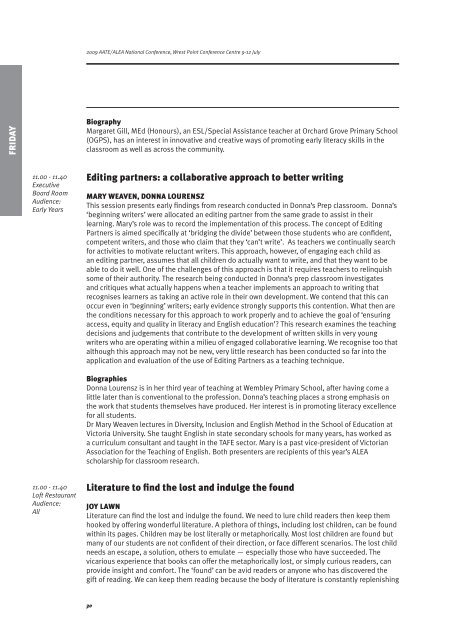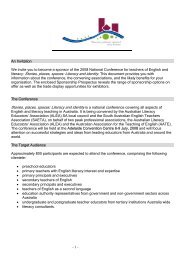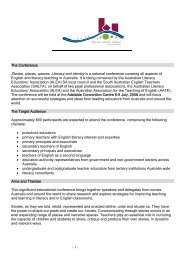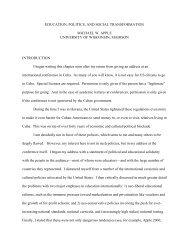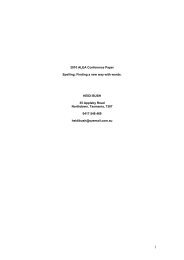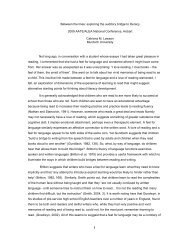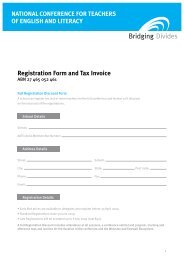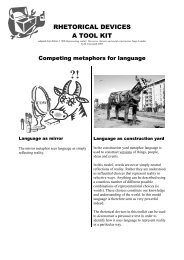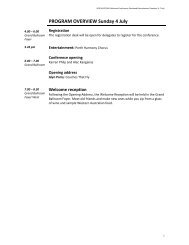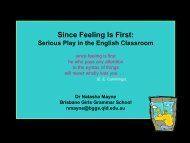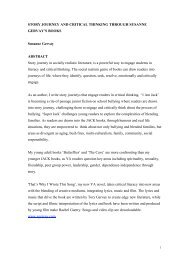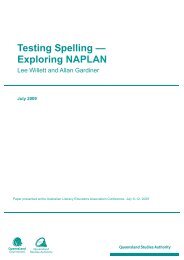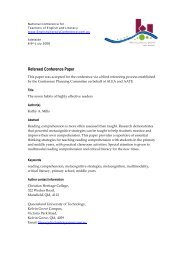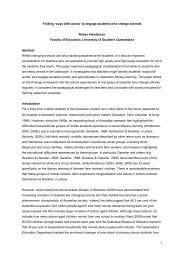Download - AATE/ALEA National conference
Download - AATE/ALEA National conference
Download - AATE/ALEA National conference
You also want an ePaper? Increase the reach of your titles
YUMPU automatically turns print PDFs into web optimized ePapers that Google loves.
2009 <strong>AATE</strong>/ <strong>ALEA</strong> <strong>National</strong> Conference, Wrest Point Conference Centre 9-12 July<br />
FRIDAY<br />
Biography<br />
Margaret Gill, MEd (Honours), an ESL/Special Assistance teacher at Orchard Grove Primary School<br />
(OGPS), has an interest in innovative and creative ways of promoting early literacy skills in the<br />
classroom as well as across the community.<br />
11.00 - 11.40<br />
Executive<br />
Board Room<br />
Audience:<br />
Early Years<br />
Editing partners: a collaborative approach to better writing<br />
MARY WEAVEN, DONNA LOURENSZ<br />
This session presents early findings from research conducted in Donna’s Prep classroom. Donna’s<br />
‘beginning writers’ were allocated an editing partner from the same grade to assist in their<br />
learning. Mary’s role was to record the implementation of this process. The concept of Editing<br />
Partners is aimed specifically at ‘bridging the divide’ between those students who are confident,<br />
competent writers, and those who claim that they ‘can’t write’. As teachers we continually search<br />
for activities to motivate reluctant writers. This approach, however, of engaging each child as<br />
an editing partner, assumes that all children do actually want to write, and that they want to be<br />
able to do it well. One of the challenges of this approach is that it requires teachers to relinquish<br />
some of their authority. The research being conducted in Donna’s prep classroom investigates<br />
and critiques what actually happens when a teacher implements an approach to writing that<br />
recognises learners as taking an active role in their own development. We contend that this can<br />
occur even in ‘beginning’ writers; early evidence strongly supports this contention. What then are<br />
the conditions necessary for this approach to work properly and to achieve the goal of ‘ensuring<br />
access, equity and quality in literacy and English education’ This research examines the teaching<br />
decisions and judgements that contribute to the development of written skills in very young<br />
writers who are operating within a milieu of engaged collaborative learning. We recognise too that<br />
although this approach may not be new, very little research has been conducted so far into the<br />
application and evaluation of the use of Editing Partners as a teaching technique.<br />
Biographies<br />
Donna Lourensz is in her third year of teaching at Wembley Primary School, after having come a<br />
little later than is conventional to the profession. Donna’s teaching places a strong emphasis on<br />
the work that students themselves have produced. Her interest is in promoting literacy excellence<br />
for all students.<br />
Dr Mary Weaven lectures in Diversity, Inclusion and English Method in the School of Education at<br />
Victoria University. She taught English in state secondary schools for many years, has worked as<br />
a curriculum consultant and taught in the TAFE sector. Mary is a past vice-president of Victorian<br />
Association for the Teaching of English. Both presenters are recipients of this year’s <strong>ALEA</strong><br />
scholarship for classroom research.<br />
11.00 - 11.40<br />
Loft Restaurant<br />
Audience:<br />
All<br />
Literature to find the lost and indulge the found<br />
JOY LAWN<br />
Literature can find the lost and indulge the found. We need to lure child readers then keep them<br />
hooked by offering wonderful literature. A plethora of things, including lost children, can be found<br />
within its pages. Children may be lost literally or metaphorically. Most lost children are found but<br />
many of our students are not confident of their direction, or face different scenarios. The lost child<br />
needs an escape, a solution, others to emulate — especially those who have succeeded. The<br />
vicarious experience that books can offer the metaphorically lost, or simply curious readers, can<br />
provide insight and comfort. The ‘found’ can be avid readers or anyone who has discovered the<br />
gift of reading. We can keep them reading because the body of literature is constantly replenishing<br />
30


